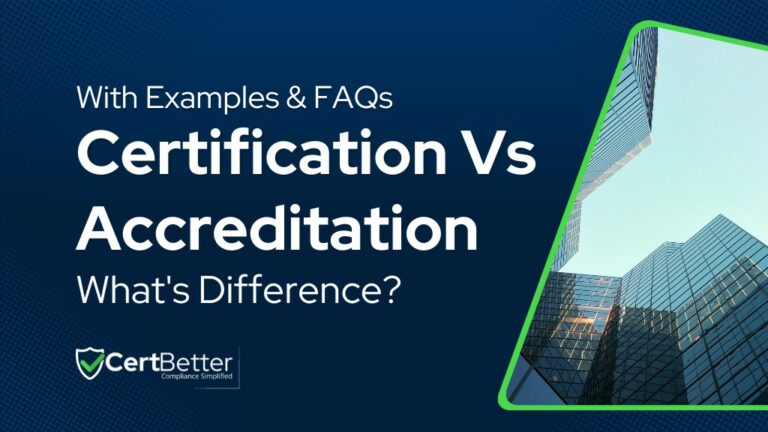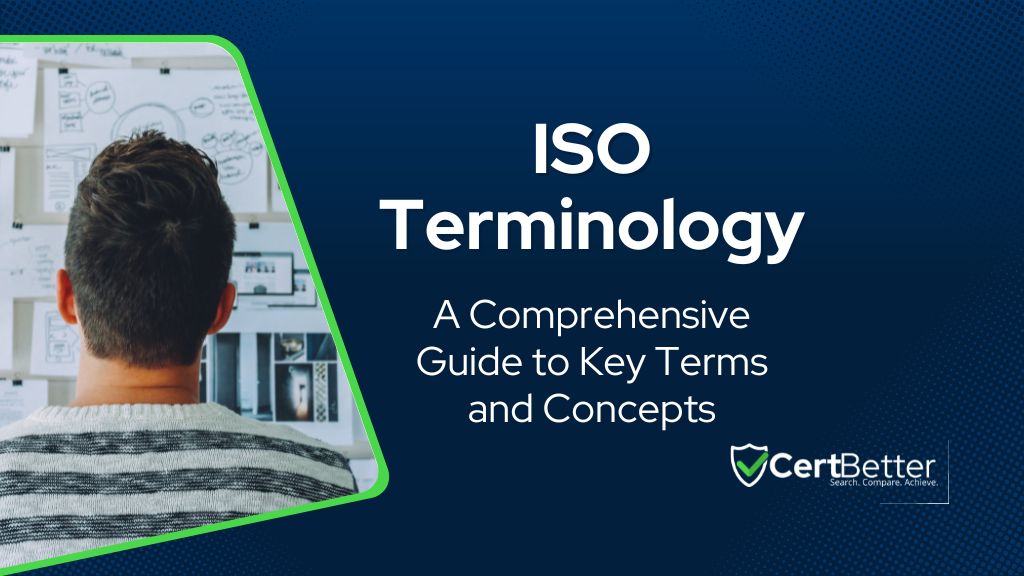Certification Vs Accreditation What's Difference? With Examples

In my auditing experience, I frequently encounter people using terms ‘accreditation’ and ‘certification’ interchangeably without understanding their unique meanings and implications. No doubt, these two compliance terms do sound alike but I can assure you that each term carries its own unique definition and importance. And yes, they are not the same!
If you’re navigating the compliance journey, I strongly recommend taking the time to understand these terms thoroughly. Understanding the comparision of accreditation vs certification is a key step in mastering compliance practices.
Let’s have a look at what both accreditation and certification actually mean, how they are applied in various industries and how they are relevant for businesses operating in Australia and globally.
What is Certification?
A Certification is a formal recognition that an organisation, product or individual meets specific standard requirements once they go through an independent assessment conducted by another company (commonly known as a certification body or accredited lab). Let’s take a look at each “certified” example:
Certified Company — When a company or organisation has undergone a certification process and has met the specified criteria of a particular standard.
Example: a “certified company” under ISO 9001:2015 has demonstrated compliance with the quality management system requirements set by this standard.
Certified Product — When a specific product of a company or organisation has been tested, evaluated and confirmed to meet certain standards or criteria.
Example: a “certified product” under the WaterMark standard means that the product is fit for purpose, safe to use and authorised for installation by a licensed plumber.
Certified Person — When an individual has been formally recognised competent for meeting specific qualifications or standards.
Example: to become a licensed plumber in a specific class, you need to apply to the relevant authority (such as the Victorian Building Authority VBA in Australia) and pass various competency assessments and verifications.
Importance of Certification
Once you understand what certification actually means, the follow-up question should be: Why is it necessary to be certified?
The simple answer is: Assurance.
Let’s take a closer look at the importance of certification:
Quality and Consistency — You know that the products or services you’re receiving or producing meet high standards of quality and reliability.
Trust and Reputation — You can trust an independent, impartial assessment because it means that your products or services have met specific criteria or standards.
Competitive Advantage — If you’re in a crowded marketplace, being certified can help your business or products gain advantage over competitors.
Following Rules — Certain certifications mean your products or services meet the legal requirements. Means keeping your business out of trouble with fewer risks.
Working Efficient — Getting certified usually means a business has to look at how it works and find ways to do things better. This can make your business more efficient.
Common Types of Certifications
Given the wide range of certifications out in the market, I’ll go over the most common ones to make it easy to understand how certifications are applied differently.
For Consumers — When you’re picking out something to buy or a service to use, you tend to favour businesses or products with certifications. It’s a bit of a no-brainer; these certifications give you the peace of mind that you’re choosing quality and reliability.
For Employers — As an employer, you’re on the lookout for staff with the right qualifications. Certified professionals are a top pick because their credentials mean they’ve got the skills and knowledge you need to get the job done right.
For Businesses — Running a business means you want suppliers or contractors you can rely on. Certified ones are the go-to because they tick all the boxes for quality and compliance, saving you a heap of worry.
For Healthcare Providers — In healthcare, it’s crucial to use certified medical equipment and supplies. This certification is all about patient safety and care, making sure everything used meets the strictest health standards.
Who Conducts Certification Assessments?
Accredited compliance service providers, such as certification or inspection companies, carry out independent assessments, verifications, inspections or validation. When these assessments are successfully completed, a business, product, or individual can then be recognised as “Certified.”
This does not mean you are accredited. Why? Let’s find out in the next section.
What is Accreditation?
In simple terms, accreditation is about checking and confirming that an organisation that offers independent assessment services to businesses or individuals is competent, authoritative and credible.
You may have encountered two terms that sound quite similar: “accreditation body” and “accredited body.” It’s important to note that these are NOT the same!
Accreditation Body — An independent national-level organisation that oversees a specific industry’s compliance (such as education or laboratories) and evaluates the organisations providing compliance services within that industry.
Accredited Body — An independent provider of compliance services (such as certification or inspection companies), dedicated to verifying and recognising businesses for their compliance efforts.
A great example is when an accreditation body like JASANZ recognises a certification body such as SAI Global Australia. This means SAI Global Australia is a JASANZ accredited (certification) body and its certificates are recognised globally.
A follow-up quick question:
Why is it necessary for certification or inspection bodies to be accredited? Let’s find out in the next bit.
Importance of Accreditation
Picture this: you’ve received your ISO certification and you’ve presented it to stakeholders or perhaps submitted it through a tender application, only to find out it’s not recognised and therefore not accepted.
What kind of risks does this non-accredited certification bring to your business? I think you know the answer.
As an ISO auditor, I have encountered several businesses in Australia that had been “certified” by so-called certification bodies lacking proper accreditation.
Having accredited certification brings a lot to the table. For example, global recognition of your products and services, customer confidence and trust, return on investment, business growth, efficient systems, fewer risks and wider access to different markets.
Common Types of Accreditations
Each type of accreditation serves a specific purpose, catering to different sectors and ensuring that standards are met across various fields.
1. National Association of Testing Authorities (NATA) in Australia
NATA is one of the most prominent examples of an accreditation body in Australia. It offers accreditation to laboratories and testing facilities, ensuring they meet rigorous standards and are competent to carry out specific types of testing, calibration and inspection activities.
As a business, you receive report certified by a NATA accredited lab.
For example, a chemical testing lab having a current NATA accreditation means it has met high standards of technical competence and professional operation as per ISO/IEC 17025. This means that their test reports or certificates can be considered reliable and accurate. Often, those test certificates or reports show the NATA logo as a trust mark.
Similarly, an environmental lab that is accredited by NATA for its ability to conduct precise environmental testing, such as water quality analysis or soil testing, ensures compliance with environmental standards and regulations. The reports you receive from an environmental lab are called certified reports (not accredited reports!)
2. Australian Children’s Education & Care Quality Authority (ACECQA)
ACECQA is an independent national authority that assists governments in administering the National Quality Framework (NQF) for children’s education and care in Australia. It accredits and oversees early childhood education and care services, like daycare centers and preschools.
As an individual, you send your children to an ACECQA accredited daycare center because this shows a high level of trust and assurance.
This accreditation ensures these services meet the National Quality Framework (NQF), focusing on areas such as educational programs, children’s health and safety and the physical environment.
3. Joint Accreditation System of Australia and New Zealand (JAS-ANZ)
JASANZ (or previously JAS-ANZ) is a government-appointed accreditation body that accredits certification bodies across Australia and New Zealand and internationally.
JASANZ’s accreditation ensures that these certification bodies are impartial and competent, providing confidence in the certificates they issue to organizations.
These certification bodies then audit organisations against various standards, such as quality management (like ISO 9001), environmental management (like ISO 14001) and occupational health and safety management (like ISO 45001).
As a business, you or your products become certified against a particular standard from a JASANZ accredited body such as Intertek.
Certification vs Accreditation FAQs
What’s difference between Certification Body and Accreditation Body?
A Certification Body assesses and certifies businesses, products, or individuals against specific standards, while an Accreditation Body evaluates and accredits the Certification Bodies themselves to ensure they are competent and credible.
Can a business be both accredited and certified?
Yes, a business can be both accredited and certified. Accreditation is usually for the bodies issuing certifications, while certification is for businesses meeting specific standards in their operations or products.
Is Accreditation mandatory for a Certification Body?
Yes, accreditation is generally mandatory for a Certification Body to ensure their assessments and certifications are recognised and accepted in the industry.
Does a certification guarantee quality or revenue?
Certification does not mean a guarantee. It often indicates that a business or product meets specific standards, often implying a commitment to quality which may or may not result in more revenue.
Who can provide accreditation?
Accreditation is provided by Accreditation Bodies, which are typically authoritative institutions or government agencies recognized at a national or international level.
Is certification or accreditation a one-time process?
Neither is a one-time process. Both require periodic reviews and renewals to ensure ongoing compliance with the evolving standards and practices.
What’s the difference between an Accredited Body and an Accreditation Body?
An Accredited Body is an organisation that has been evaluated and approved by an Accreditation Body. In contrast, an Accreditation Body is the national-level authority that performs the evaluation and grants accreditation to these organisations.
What’s the difference between accredited certification and non-accredited certification?
An accredited certification means that it is well-known and accepted globally. In contrast, non-accredited certification means it might not be as widely accepted or trusted.
Final Thoughts
To sum up, now you understand the distinct meanings, differences and roles of accreditation and certification. As you see, both are important in ensuring assurance and fostering a climate of trust and continuous improvement. Should you have any queries or comments, feel free to drop them below, and I’ll gladly offer additional help and insights.
- Last updated: November 20, 2023
- CertBetter
Our community of compliance professionals and ISO experts is ready to provide you with insightful answers and practical solutions. Join the discussion now!
- Recommended Reads
- 27 reads
-
Frequently Asked Questions
Understanding ISO Terminology: Guide to Important Terms and Concepts
No posts found
ResetConnect with ISO Certification Consultants
CertBetter makes it easy to find ISO certification consultants and compliance professionals from around the globe.

